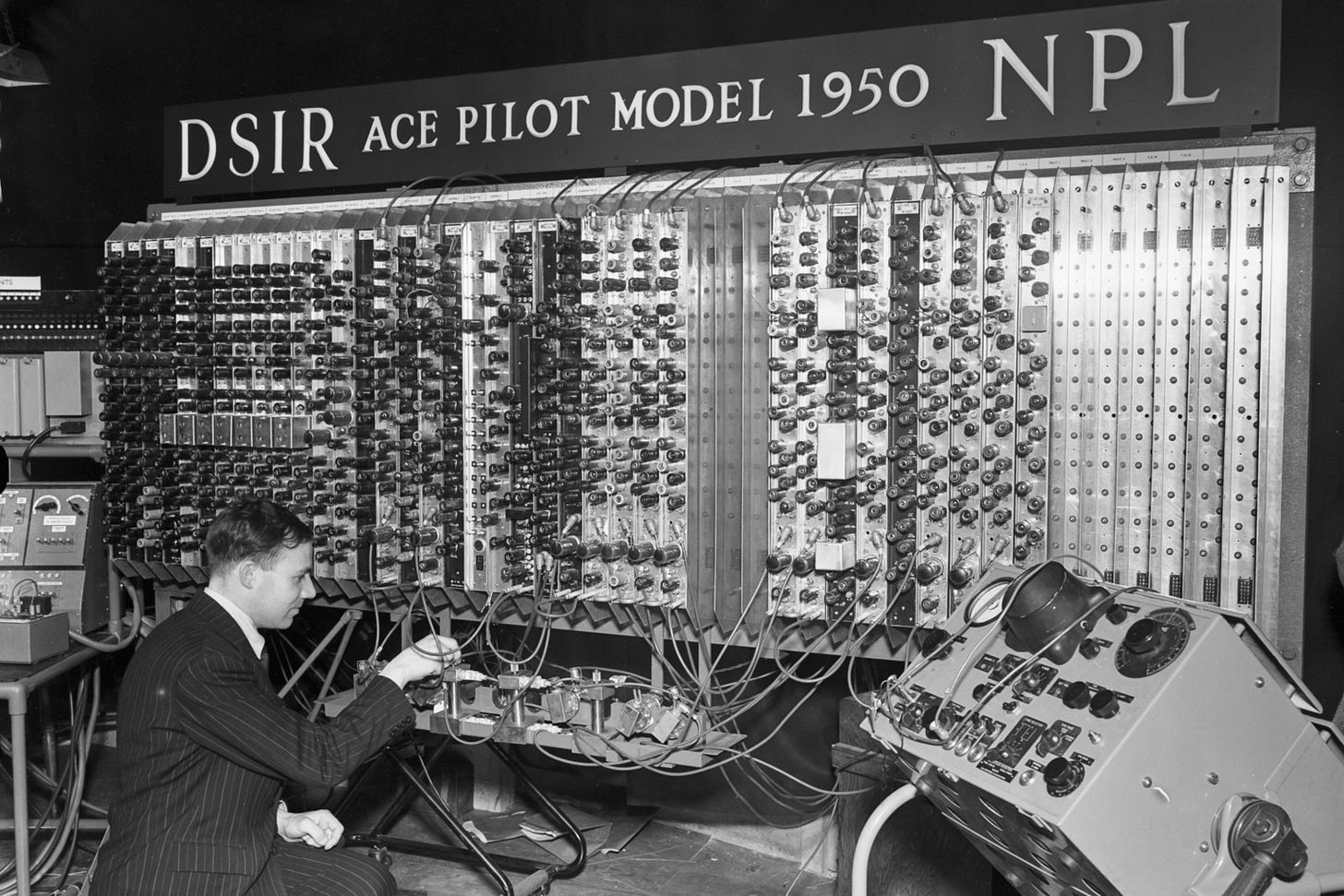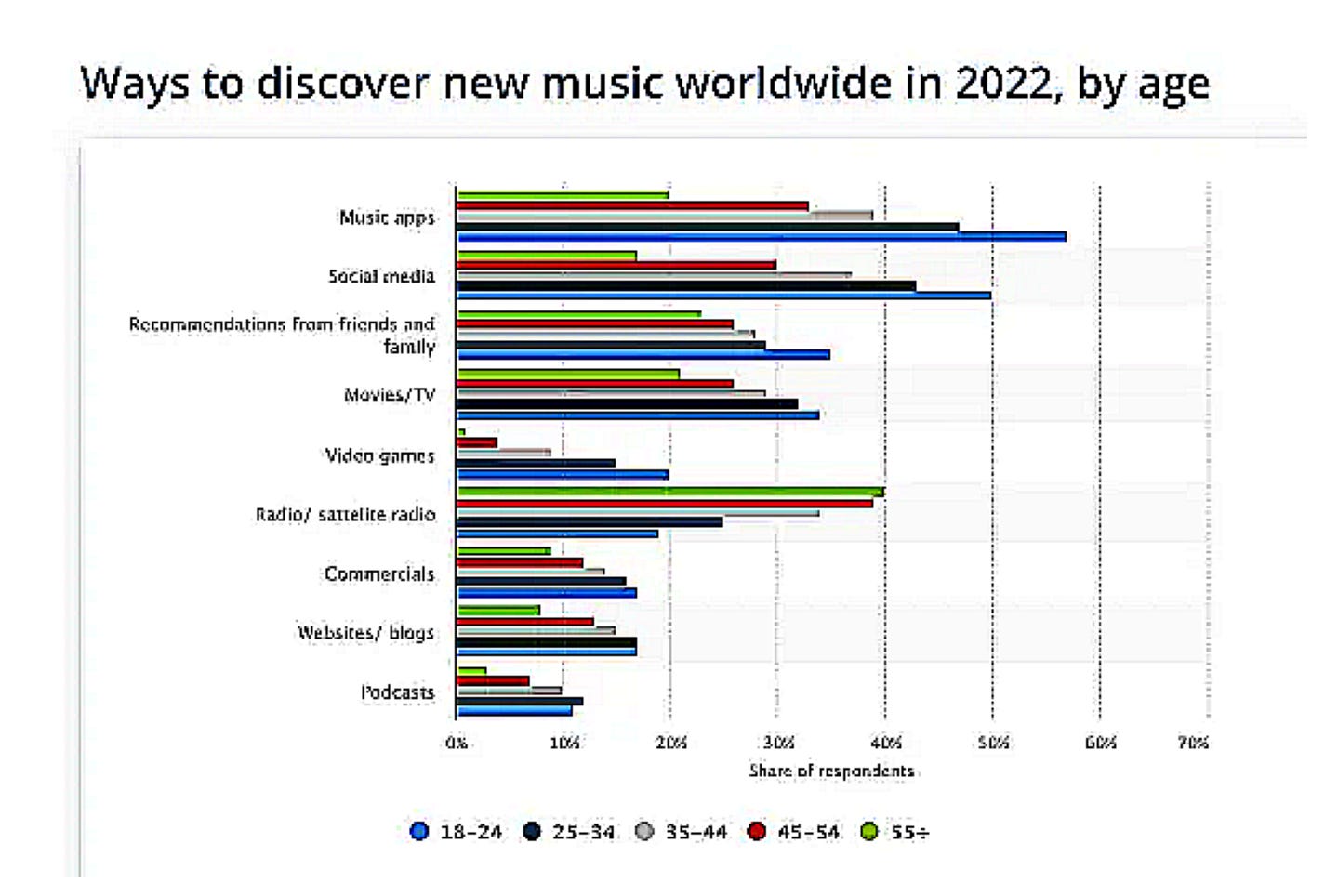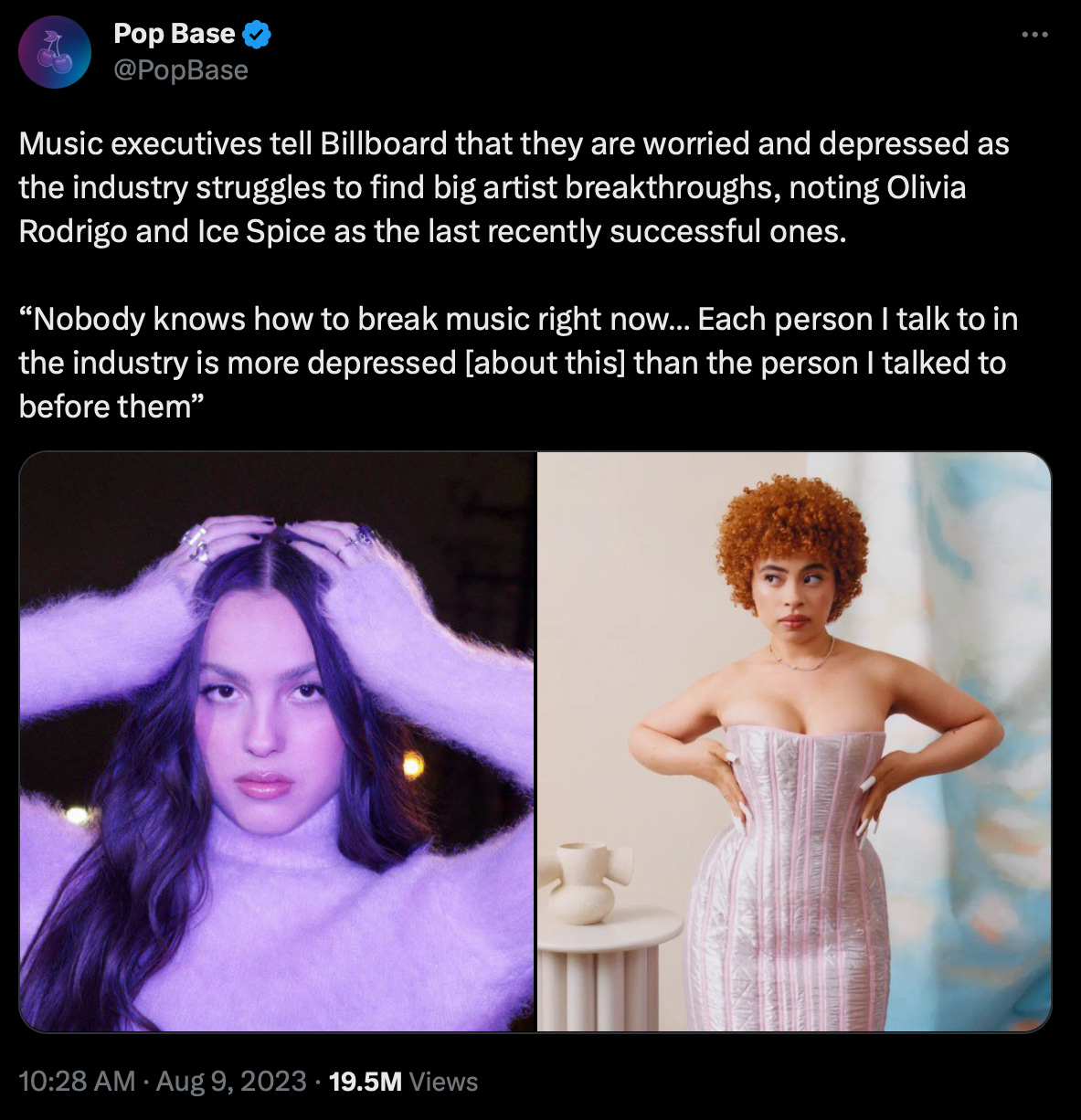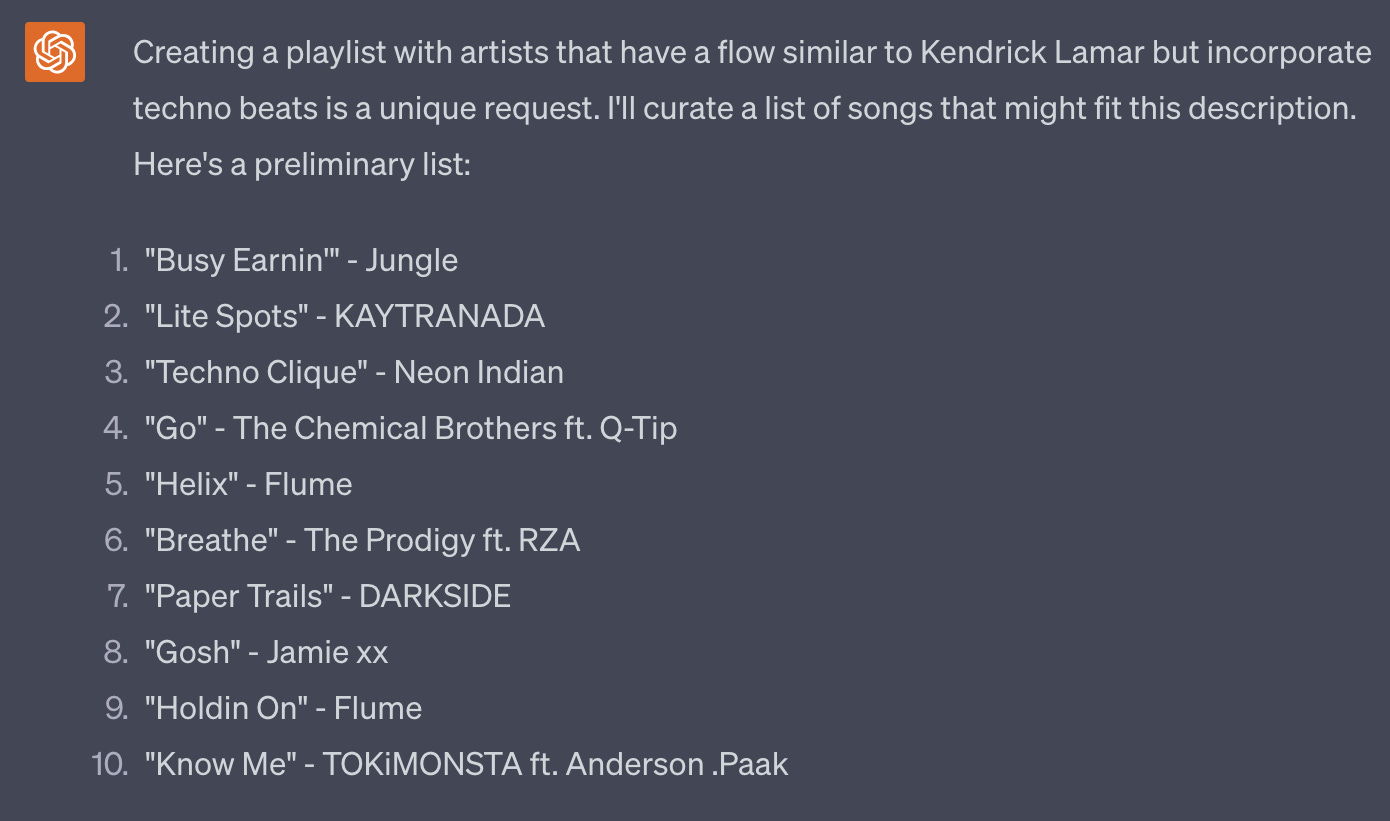🤖 Recommendations Are All You Need
The rise of LLM's like Chat-GPT mean that all of humanity's knowledge is now an API call away. What does this mean for recommendation systems?
We write a weekly newsletter on all things Music, and the Business and Tech behind it. If you’d like to get it directly in your inbox, subscribe now!
Hey everyone,
It’s been over 9 months since Open AI decided to launch Chat-GPT & without sounding overly hyped about it, it feels as if technology hit an inflection point.
Chat-GPT has become the fastest growing consumer product of all time, billions of dollars have been invested in AI startups since then and NVIDIA which makes GPU’s- the backbone of computing infrastructure for AI, has seen it’s stock gain over 200% since the start of the year 🚀
Y Combinator- the popular startup program credited with incubating companies like AirBnB and Doordash, has majority of it’s current cohort doing something directly around AI.
While the topic of how value is created and captured in AI is hotly debated, something Paul Graham- billionaire investor & co-founder of Y Combinator tweeted recently struck me as the ‘aha’ moment for why the hype is merited around AI 👇🏻
Machine Learning (a subset for the broader concept of AI) has been used in traditional software products for decades now.
It powers everything from recommendation systems for helping you decide which Netflix show to watch or Spotify playlist to listen, to the traffic estimation you get from Google Maps.
AI itself as a field has been around since the 1950’s, pioneered by British computer scientist Alan Turing (of Imitation Game fame) but only recently have AI models gotten good enough to go beyond just simply recommending you which movie to watch.
In 2017, researchers from Google released a seminal paper titled 'Attention Is All You Need.'
This paper introduced the ‘Transformer Architecture’- a novel method for AI models to accurately predict the next word in a sentence given an input prompt. The approach involves focusing attention on specific words within the sentence to provide better context."
It might sound trivial but this breakthrough gave rise to a whole generation of Large Language Models, most famously the Generative Pre-Trained Transformer or popularly known as Chat-GPT by Open AI, which released back in November 2022.
What does this mean for Music?
While the impact of AI on music production is an entirely different ball-game & drawn massive controversy, I think an under-appreciated topic is how LLM’s like Chat-GPT can change how users discover new music.
Since streaming has become mainstream over the past decade, the primary ways users discover new music has shifted from Radio/TV/Magazines to recommendation algorithms of music streaming platforms such as Spotify, Apple Music & YouTube.
I’ve previously written at length about how Spotify & Apple Music have adopted different approaches when it comes to AI powered recommendations, but this was before LLM’s like Chat-GPT really became viral 👇🏻
Specifically in the past 5 years, the popularity of short-form video apps like TikTok & Instagram Reels has further influenced the kind of music users listen to, especially given the added context with short-form videos.
Here’s data from a survey in 2022 showing how users primarily discover new music 👇🏻
More than 100,000 tracks are released on streaming platforms daily, increasing the need for recommendation algorithms to better surface music for users based on their listening history, user interactions, audio features and much more.
However, while there is information available on how these algorithms work on a broad level, it still exists in a black-box and proprietary to each platform.
Why?
Music streaming as an industry enables access to a commodity- songs themselves. Unlike video streaming, every music streaming platform like Spotify, Apple Music or Amazon Music, has access to the same catalog of 100 million songs.
Which is why to ensure differentiation, the primary way streaming platforms compete is their design, specific features and recommendation systems which ensures users stay locked into their apps.
On the other hand, because discovery today happens primarily via recommendation systems of music streaming platforms and social media apps, artists & their marketing teams have had to devise ways to ‘hack’ the algorithm & even change how their songs are produced.
All of this, only to ensure maximum probability of being play-listed and appearing higher in charts.
Artists with greater marketing budgets can afford to run paid ads on social media & tie up with influencers and curators who align with their target audiences & can help place their songs in playlists to ensure higher streams.
While this does increase the likelihood of getting more streams & eventually hoping to convert a user to a regular listener by adding to their library, it’s still pretty much a spray & pray approach without a clear ROI for artists investing their money.
And this has left artists & their marketing teams scratching their heads 🤔
The existing ad platforms on Instagram & TikTok, while enabling artists to be granular in terms of how they can target potential audiences, are generally not considered the best way to promote music. The likelihood of someone engaging with a song being promoted as an Ad on TikTok/Instagram & converting into a loyal listener is pretty low.
The other alternative is paying money for placing songs in playlists, enabled through platforms such as Submit-Hub and even Spotify’s own playlist pitching tool.
However, these are riddled with inefficiencies and prone to bias. Artists signed onto bigger labels or those with undue influence within streaming platforms can easily get their music featured in the top playlists over everyone else.
There is no way to connect demand for users explicitly defining what kind of songs they want recommended, with artists who want to target users based on that
What’s The Solution?
LLM’s like Chat-GPT, trained on the corpus of internet data & fine-tuned to user listening history can shift music recommendations from being a lean-back way to discover music, to being a lean-in way to capture user intent and deliver specific recommendations based on what the listener wants & not what the algorithm ‘predicts’.
For example, I asked Chat-GPT to curate a playlist of songs having Kendrick Lamar’s flow but with Techno beats. It has no context on my personal music listening history. Here is the result:
Here’s a link to this playlist if you’re interested. I personally found it to be quite accurate, at least based on the prompt i’d given.
One can easily imagine that given the right level of prompt engineering & fine-tuning the model, the output becomes more relevant & contextual for the user.
Now imagine the artist, whose music they feel would fit perfectly into this sub-genre of music but has no way to target such users. If a Google Ad-Words style platform existed, artists could bid for keywords of particular songs/artists they would want their songs associated with.
For example, in the above case of a playlist being spun off with the prompt of Kendrick Lamar but with techno beats, an artist who wants their music be associated with Kendrick or Techno, can through the Ads platform bid for those keywords & have their songs be included as part of the newly created playlist.
A marketplace could be built here where given enough consumers start using this to search for music/curate playlist, this would become an important place for artists to be visible and be able to pitch/promote their music.
And just like how travel aggregators bidding the highest for keywords like ‘Hotels Near Me’ get featured in Google’s top search results, a similar platform could be created that bridges this gap between users explicitly stating the kind of music they want recommended/curated & artists being able to pitch against those prompts.
How will this improve the existing system?
Artists will have 100% clarity in terms of how the money they spend bidding for keywords translates into placements of songs at specific places within the playlist, instead of a spray & pray approach running Ads on social media or by tying up with influencers/curators.
One might argue here, why can’t Spotify or Apple Music build this? They already have the search feature and the user-base, along with artists on their platform.
There are two ways to look at that.
Large companies are slow to ship features & make big changes to what’s already working. Although that might not be true for Spotify specifically, which has already experimented with its AI DJ.
A stronger argument is that this method of connecting what users demand in terms of recommendations with artists being able to pitch them directly, is not the business of Spotify.
Spotify makes money by charging users a fixed monthly fee for access to their entire Catalog of music and gives away 70% of that revenue to rights-holders (labels/publishers/artists).
Being a business, it will try and reduce this cost of licensing which it has experimented with using Discovery Mode to pay lesser royalties to artists in exchange for being surfaced more often.
However, for Spotify to entirely open up this process of artists being able to buy keywords and pitch their songs directly as part of the output of the AI, means they no longer control the bottleneck or their secret sauce- the recommendation algorithm.
They cannot favour an artist signed to a major label over an indie artist or promote a song favourably in playlists or algorithms where the costs of licensing are lesser.
My hunch is that Spotify and other streaming platforms do not have an incentive to experiment with something like this. Which opens up the opportunity for a startup to build this.
We’re experimenting with something around it & this is how it works. Will LLM’s shift how users get their music recommended?
If you’re an artist or run marketing for one we’d love to chat & get your thoughts!
If you’re an iOS user & want to peek under the hood of what our app looks like, hit us up here 👇🏻
P.S- Our Instagram Page just hit 37k followers & we’d love for you to join the party!
Have a good week everyone 💪🏻











